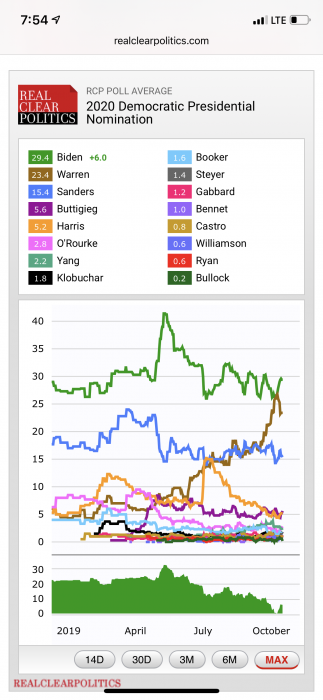DUMP TRUMP (previously 2020 candidates)
drummerboy said:
How do you define "huge hit" when his support has been on a steady decline for months?
I guess it's in the sense of taking a "huge hit" to his poll numbers
drummerboy said:
I predict AOC's endorsement will have exactly zero effect on Sanders' polling numbers.
I voted for Bernie in 2016. I've been pretty strongly in the Warren camp for most of this season but I have to admit that Bernie's performance last night followed by AOC's endorsement has me thinking about my position today. I am pretty sure that I am still for Warren and I have taken Mayor Pete's warnings about the state of the post Trump world to heart but damn, Bernie is a hell of a fighter. If he were just 15 years younger I would walk on fire for the man.
drummerboy said:
How do you define "huge hit" when his support has been on a steady decline for month
His support has been steady throughout.
nan said:
drummerboy said:
How do you define "huge hit" when his support has been on a steady decline for month
His support has been steady throughout.
This is his strength and his weakness. His floor is his ceiling. If, when Biden drops out, Bernie's numbers don't change his candidacy will be over even if his campaign continues.
nan said:
His support has been steady throughout.
his poll numbers were substantially higher before Biden entered the race
drummerboy said:
basil said:
Who came up with this stupid Electoral College idea then?
The primaries have nothing to do with the EC, I think is the point.
You don't think they look awfully similar? (pre-defined number of delegates / electors by state instead of the good old popular vote?).
I am pretty sure that if the Presidential Election was decided by popular vote (as it should be if we were a democracy instead of a republic), then the primaries would also be decided by popular vote.
The biggest difference between the primaries and the general for the Democrats: the primary elections are NOT winner take all. I've said this before. The basic rule if thumb is if you get more than 15% of the votes in a state you are awarded a portion of the delegates from the state.
basil said:
You don't think they look awfully similar? (pre-defined number of delegates / electors by state instead of the good old popular vote?).
I am pretty sure that if the Presidential Election was decided by popular vote (as it should be if we were a democracy instead of a republic), then the primaries would also be decided by popular vote.
State primaries and caucuses didn’t start determining convention delegate totals until the 1970s. You thinking the parties were still looking to the founders and the Electoral College for guidance then?
mrincredible said:
The biggest difference between the primaries and the general for the Democrats: the primary elections are NOT winner take all. I've said this before. The basic rule if thumb is if you get more than 15% of the votes in a state you are awarded a portion of the delegates from the state.
I think that varies, both by party rules and by states, no?
Well, we're talking about one particular party here. But as far as I can tell it's proportional across all states. Again, only candidates with more than 15% of the vote total get delegates.
I really think this is a bigger deal than people are accounting for.
mrincredible said:
Well, we're talking about one particular party here. But as far as I can tell it's proportional across all states. Again, only candidates with more than 15% of the vote total get delegates.
Unlikely as a result like this is, the field is large, and the rules allow for winner-take-all if only one candidate gets 15% or more.
DaveSchmidt said:
Unlikely as a result like this is, the field is large, and the rules allow for winner-take-all if only one candidate gets 15% or more.
True. Right now, though, three candidates consistently poll at higher than 15% in a lot of state polls. There's nobody who currently appears to be running away with the race.
Like I said that could change. But Sanders' support seems to have a floor in the teens to 20s, and I think the same is true of Biden. Depending on Warren's performance on the campaign trail she may be right there as well.
Meanwhile I heard on the radio yesterday that Buttigieg has something like $25M in his campaign fund and is heavily spending on ad buys and campaign staff in early voting states.
I doubt we'll see any state races where four candidates hit the 15% threshold but I bet we see lots where two candidates do, and maybe a few elections with three candidates taking home delegates.
Just looked up winner take all in primaries and there are 8 states but they are on the Republican side.
mrincredible said:
Well, we're talking about one particular party here. But as far as I can tell it's proportional across all states. Again, only candidates with more than 15% of the vote total get delegates.
I really think this is a bigger deal than people are accounting for.
Ah, I thought you were talking about primaries in general, not the Democratic primaries specifically. I prefer the proportional approach the Democrats use.
PVW said:
Ah, I thought you were talking about primaries in general, not the Democratic primaries specifically. I prefer the proportional approach the Democrats use.
It certainly gives an incentive for more candidates to hang in there longer. Someone like Buttigieg or Booker or Harris still has a shot of picking up some delegates. If you're sitting in the high single digits nationally but doing better in a few early voting states, you hang in, keep raising money and campaigning.
Maybe some early delegate pickups help you build some momentum. At the very least in a race like this if a candidate has won some delegates, they have some leverage with other candidates who might need those delegates at the convention.
mrincredible said:
PVW said:
Ah, I thought you were talking about primaries in general, not the Democratic primaries specifically. I prefer the proportional approach the Democrats use.
It certainly gives an incentive for more candidates to hang in there longer. Someone like Buttigieg or Booker or Harris still has a shot of picking up some delegates. If you're sitting in the high single digits nationally but doing better in a few early voting states, you hang in, keep raising money and campaigning.
Maybe some early delegate pickups help you build some momentum. At the very least in a race like this if a candidate has won some delegates, they have some leverage with other candidates who might need those delegates at the convention.
IIRC for most of the Republican primary season Trump never got an actual majority, but the winner-take-all contests gave him a lot of delegates. While the GOP is now firmly Trump's party, that wasn't the case during the primaries, and I wonder how a more consistently proportional system would have changed the results there.
basil said:
drummerboy said:
basil said:
Who came up with this stupid Electoral College idea then?
The primaries have nothing to do with the EC, I think is the point.
You don't think they look awfully similar? (pre-defined number of delegates / electors by state instead of the good old popular vote?).
I am pretty sure that if the Presidential Election was decided by popular vote (as it should be if we were a democracy instead of a republic), then the primaries would also be decided by popular vote.
The United States of America.
This is a good piece that highlights the fatal flaw in progressives’ 2020 argument.
“Why on earth would Americans rally to her call for “big structural change” to the economy when they say the economy is working for them?”
Now Biden may be weak enough that a progressive wins the nomination. And Trump may be toxic enough for that progressive to win next November. But if a any moderate Democrat candidate or the Republican incumbent President were halfway decent, progressives would be out in the wilderness.
Warren's strategy will rely on finding enough smart people who understand the economic issues to come out to the polls.
Always a risky strategy in America.
STANV said:
basil said:
drummerboy said:
basil said:
Who came up with this stupid Electoral College idea then?
The primaries have nothing to do with the EC, I think is the point.
You don't think they look awfully similar? (pre-defined number of delegates / electors by state instead of the good old popular vote?).
I am pretty sure that if the Presidential Election was decided by popular vote (as it should be if we were a democracy instead of a republic), then the primaries would also be decided by popular vote.
The United States of America.
That's kind of my point.
Smedley said:
This is a good piece that highlights the fatal flaw in progressives’ 2020 argument.
“Why on earth would Americans rally to her call for “big structural change” to the economy when they say the economy is working for them?”
Now Biden may be weak enough that a progressive wins the nomination. And Trump may be toxic enough for that progressive to win next November. But if a any moderate Democrat candidate or the Republican incumbent President were halfway decent, progressives would be out in the wilderness.
Predicting how people will vote a year from now is generally a fool's errand. Second, with Donald Trump in the White House, predictions become even more difficult. Not that I give any weight to David Brooks, but in today's NYT, even he said if the election is Trump-Warren, the logical choice is to support Warren over Trump.
But pretty obvious to me, but maybe not to everyone, is that an awful lot of people don't base their votes on their own personal economic circumstances. If they did, would there be such creatures as Limousine Liberals or poor white rural Republicans? Of course not. And a lot of people will say that the economy is working for them now, but other surveys point to a lot of insecurity about the future, both for themselves and for their children. Not to mention other questions people have about the affordability of things like health care in the future, or the direction that climate change is taking.
I could be totally wrong, and Trump could trounce Warren or Sanders in the next election. But it's just as likely today that he would trounce Klobuchar or Biden. Anyone who thinks they know the answer to this is fooling themselves. But I do know that looking very simplistically at one type of survey question and saying it predicts 2020 is also a mistake.
I read that column and conclude that Thiessen is engaging in a lot of wishful thinking. Anyone who clicks on the link and reads the results of other questions on the survey will find also that:
- 63% of respondents support the Green New Deal
- 62% favor a Wealth Tax
- 56% support a $15 dollar minimum wage
- 53% want the U.S. to rejoin the Paris Climate accord
- 53% favor free college
- Only 44% favor "Medicare For All" but 70% favor "Medicare for all who want it"
Personally, I think it's a dishonest columnist who will read a survey and cherry pick one result that supports his pre-determined conclusion. I'd read that survey result and come to a pretty different conclusion based on the issues people support. But I'm also fully aware that people don't always vote logically, so in the end, who knows?
I agree on the who knows bit. For one, there's still plenty of time for the economy to crap the bed which would most likely sink trump. And Trump may not even be the nominee given all the stuff that's swirling. But the premise remains that it ain't easy to push big economic change in an economy that's generally doing decently. If it ain't broke...
Smedley said:
I agree on the who knows bit. For one, there's still plenty of time for the economy to crap the bed which would most likely sink trump. And Trump may not even be the nominee given all the stuff that's swirling. But the premise remains that it ain't easy to push big economic change in an economy that's generally doing decently. If it ain't broke...
then why did all those people respond in the affirmative for a bunch of big changes?
Regardless of what any of us think, I would hope we can agree that that Thiessen column was a) very dishonest and b) contemptuous of the reader in the sense that he probably didn't expect many people to do five minutes work to read through the entire survey. IMHO, that kind of punditry is precisely what's wrong with our politics. In the name of "balance" he goes after Warren, the Democratic frontrunner. But in doing so he presents an extremely unbalanced view of the underlying information he's basing his argument on. I wanted to engage with Thiessen's substance and not go for an ad hominem argument, and I think that I've done that. Now that my argument is presented, I'll say it -- Thiessen is a total hack.
ml1 said:
Smedley said:
I agree on the who knows bit. For one, there's still plenty of time for the economy to crap the bed which would most likely sink trump. And Trump may not even be the nominee given all the stuff that's swirling. But the premise remains that it ain't easy to push big economic change in an economy that's generally doing decently. If it ain't broke...
then why did all those people respond in the affirmative for a bunch of big changes?
Regardless of what any of us think, I would hope we can agree that that Thiessen column was a) very dishonest and b) contemptuous of the reader in the sense that he probably didn't expect many people to do five minutes work to read through the entire survey. IMHO, that kind of punditry is precisely what's wrong with our politics. In the name of "balance" he goes after Warren, the Democratic frontrunner. But in doing so he presents an extremely unbalanced view of the underlying information he's basing his argument on. I wanted to engage with Thiessen's substance and not go for an ad hominem argument, and I think that I've done that. Now that my argument is presented, I'll say it -- Thiessen is a total hack.
You criticize Thiessen for cherry-picking but you did just that in citing a half-dozen data points that work for you.
The Marist poll is 37 pages. The information is presented in an order that I don't believe is random. Rather, it's presented in approximate order of importance as the pollsters see it.
Do you approve/disapprove of Trump first. Do you definitely plan to vote for/against him next. Then (dis)approval of Trump's handling of the economy and foreign policy.
Then on page 11 -- is the economy working or not working for you personally.
Then it gets into specifics.
So Thiessen based a column on a broad stroke of the survey that is one of the most important data points in terms of how people can reasonably be expected to vote. Certainly more important than who's promising free college. I have no idea how this column is dishonest, contemptuous of the reader, and hackish.
Regardless, Thiessen is a hack and has been for years. He is not an honest broker.
Anyway, Warren's campaign will not be focused around "structural change of the economy". It will be focused on specific economic issues related to that, which people can easily relate to and which they already support, as ml1 has pointed out.
drummerboy said:
Regardless, Thiessen is a hack and has been for years. He is not an honest broker.
That may be true. To be honest, I'm not familiar with him, I just looked him up to see who he is. Just thought this particular column was decent regardless of who wrote it.
Smedley said:
The Marist poll is 37 pages. The information is presented in an order that I don't believe is random. Rather, it's presented in approximate order of importance as the pollsters see it.
The first two sentences are correct. The third one is mistaken. The information is presented in the order it was asked, and “importance” isn’t how pollsters order questions.
A questionnaire, like a conversation, should be grouped by topic and unfold in a logical order. It is often helpful to begin the survey with simple questions that respondents will find interesting and engaging to help establish rapport and motivate them to continue to participate in the survey. Throughout the survey, an effort should be made to keep the survey interesting and not overburden respondents with several difficult questions right after one another. Demographic questions such as income, education or age should not be asked near the beginning of a survey unless they are needed to determine eligibility for the survey or for routing respondents through particular sections of the questionnaire. Even then, it is best to precede such items with more interesting and engaging questions.
More details from Pew, under “Question order”:
https://www.pewresearch.org/methods/u-s-survey-research/questionnaire-design/
I was referring to how the poll results are presented to readers, not how the poll questions are presented to poll participants.
Featured Events
-
Stephen Whitty Presents - Hometown Movie Stars: The Celebrated Actors Of CHS
May 6, 2024 at 7:00pm


























How do you define "huge hit" when his support has been on a steady decline for months?